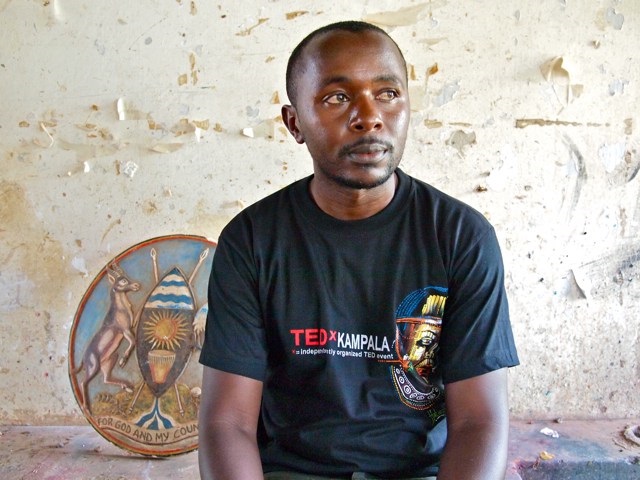
Kampala, Uganda | THE INDEPENDENT | An interview with Bruno Ruganzu, Uganda’s foremost eco-artist, by The Independent’s Dominic Muwanguzi
You have been involved with TEDx for six years. What is TEDx about?
Firstly, TED is an acronym for Technology, Entertainment and Design. TEDx is a product of the former, with the X meaning the independence of the platform. TEDx is an international podium that is curated and invites individuals, not only in the creative sector, to share ideas and find solutions to problems within the local community. The first TEDx talk in Uganda was held in Kyabongo University in 2012 and pioneered by me. I invited artists like Collin Sekajugo, Ronex and Sannaa Gateja to talk about recycling in art. Since then, I have held several talks in different parts of the country under TEDx and the impact of such dialogue has been profound. Presently there’re about eight Tedx talks across the country.
How has TEDx impacted your art?
I have got exposure for my art beyond the boundaries of my country, Uganda. I have participated in several art residences throughout Europe where I have made presentation on my artwork and collaborated on numerous art projects. So far, the biggest highlight for my exposure is the art residence I attended in USA in 2015. Here, I was paid USD$1,100 per a week and this was exclusive of accommodation, transport and meals that were catered for. Interestingly, I got contact for this residency through an artist friend I met in Canada. I never thought it was this so easy to get into a residence with a fully paid scholarship. This particular experience, until this day, has been an eye-opener because I am no longer overwhelmed by artists in residence anywhere in the world.
What lessons are there to learn for young artists, especially since you started when you’re young?
Young people today are living in a digital era where things are happening too fast. When they are on the internet, they want their work to be in Japan, London and USA with the click of the button. However, it is important that they exercise patience because everything happens in its right time. Before I started showcasing my art in Europe, I was working here and not thinking of travelling or exhibiting my art anywhere in the world. I concentrated on making art that had a message and solutions for my people. It is through such local prominence, that I attracted the attention of the West. As such, if they calm down and exploit what is around them, they’ll go wherever they want to go.
Interestingly, there is an urge among many young artists and some already established ones to participate in international festivals in order to get validated. Do you think international acceptance is important before one can establish themselves locally?
There’s a myth about being an international artist. International can also mean locally based without necessarily travelling across the globe. What is important is local relevance of the artist’s work. The art must have a message for your own people before it is embraced elsewhere. An example here is the Kenyan artist Michael Soi whose bags under the theme of social circles has captivated the local audiences in Kenya. After such significant impact, he’s being embraced in America, Japan, England and elsewhere. Soi, never really thought of international acceptance when he was making these functional bags, but had an idea of solving his community’s problems through art. Additionally, there’s the issue of the politics that surrounds some of these international festivals that artists crave to participate in. You may never feature in Paris Art Fair or Venice Biennale unless you are part of the system that organises some of these art events. It is more of a capitalistic tendency that excludes many artists from the continent, even though some may have good art to showcase there.
What are you working on presently?
I have started a local platform, Ubuntu Talks, to talk about community problems and find solutions to them. The initiative is inspired by the concept of Ubuntu which is: I am because We are. It is rooted in the African traditional setting where our fore-fathers built relationships and solved problems through community dialogue. Our conversation currently has been on the subject of refugees in Uganda, especially those from Somalia. We ask the question what is our relationship with them. Do we perceive them as an inconvenience in our community or relate with them because anybody can be a refugee today? The response to help the immigrants is so far impressive with one participant hatching an idea of contributing to the welfare of these emigrants through visiting bars and asking the proprietors to contribute at least five hundred shillings off each beer bought by the patrons. This is a symbolic gesture to celebrate humanity and it is replicated throughout my art.
*****
Bruno Ruganzu is winner of the TEDx competition city 2.0, in 2012, in Doha, Qatar. Since then, he has traveled extensively throughout the world participating in numerous art festivals and residences. He is also a lecturer at Kyabongo University.
 The Independent Uganda: You get the Truth we Pay the Price
The Independent Uganda: You get the Truth we Pay the Price





